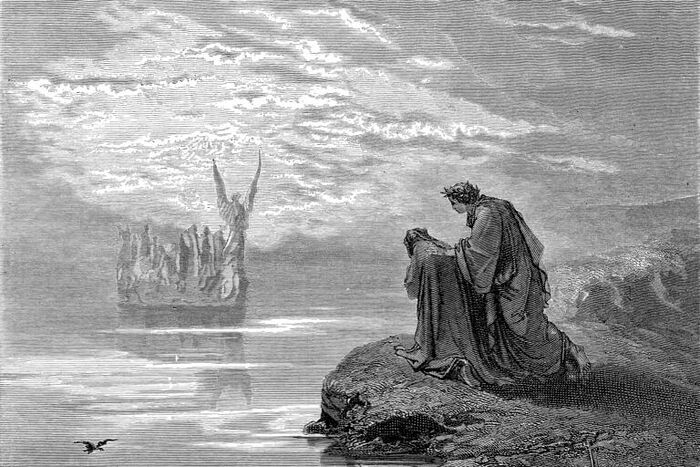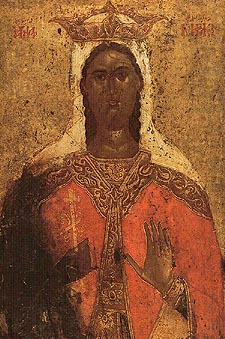BETRAYED BY ALL AND BLESSED BY GOD
A Homily for the Feast of the Royal Martyrs
 In the name of the Father, and the Son, and the Holy Spirit.
In the name of the Father, and the Son, and the Holy Spirit.
Today is a special, extraordinary day for all of us. What happened in 1917-1918 is a terrible lesson for all times. Today we glorify a man who was slandered, debased, subjected to scorn, misunderstood, and betrayed like none other in all of Russian history. He was a man of truly holy life. People say he was glorified for his final period of passion-bearing, and that’s true. That’s the Church’s consciousness and understanding. But he was heading for that his entire life. It’s impossible to separate this time from March 1917, when he was betrayed and then arrested together with his family; until July 17, when all of them together, as one person (the only ones who remained faithful to each other and to the autocrat placed by God over the Russian land), received a martyr’s death.
No one has done so much so sincerely for Russia and earned such terrible ingratitude as Emperor Nicholas II. There were times when, it would seem, the people loved him and treated him as ordained by God—as a father. But these were short and conniving periods. In 1903, when St. Seraphim was glorified, there was rejoicing among the common folk. In 1914, when the German and Austro-Hungarian armies attacked Russia, there was also an explosion of popular sentiments: Everyone united to defend the country. But just four years passed and the majority of people were crying out: “Crucify… crucify him!”

There is evidence of how the majority of the people reacted to the execution—the evil and inhuman murder of the Emperor and his family. We’ve investigated this murder; we’ve determined what happened minute-by-minute in the Ipatiev House then. It was truly terrifying! The execution lasted about forty minutes altogether. The boy, Tsarevich Alexei, suffered the longest. They were killed with bullets, bayonets, butts. And what was the people’s response to this cruel murder of God’s anointed, who was appointed by God as Tsar for the people? The poetess Marina Tsvetaeva, the former Finance Minister of the Russian Empire Kokovtsev, and others, recall it. Newsboys ran through the streets shouting: “The Tsar’s been executed!” There was no reaction, except for words that show to what depths we can fall: “A dog’s death for a dog,” “That Nick has had his share of dancing”… Not a word of sympathy! Only Patriarch Tikhon raised his voice, saying that we must commemorate him and his family in our prayers. A few priests throughout Russia served panikhidas for the Royal Family, which not many people came to. As their contemporaries write, mostly either dull indifference or malevolence reigned.
The holy Passion-Bearer Emperor Nicholas Alexandrovich gave his all for the good of Russia. Patriarch Tikhon answered for the Church, and therefore he said: “Let my name be erased from history, if only the Church would benefit.” Emperor Nicholas II was responsible for Russia, and realizing that he was consciously sacrificing himself and the most precious thing he had—his wife and children—he said: “There’s no sacrifice I wouldn’t make for the sake of the true good and the salvation of my homeland, Mother Russia.”
He had no illusions about what their fate could be when they were taken first to Perm, then to Ekaterinburg. We can’t imagine what a burden there was on his soul, and at the same time, what peace! They didn’t allow him to do the work he served—to liberate Russia from the invaders—although Russia was one step away from victory. A wave of betrayal came crashing down upon him from people who shouted that they were saving Russia from a cabal and from ruin, for which most of our compatriots, in their insanity, blamed the Emperor, his wife, and family. They were accused of giving the country over to the hands of the enemies, the Germans; that they would destroy everyone.
But the exact opposite happened. Those who shouted and raged, fully confident that they were right, actually turned out to be traitors who gave their country into the hands of bloody executioners who shed rivers of blood in Russia. Later some of these criminals realized what they had done. But at that time there was fervor and force: “These people (as they called the Emperor, the Empress, and their companions) don’t understand anything—we understand!” Self-satisfaction, pride, and demonic possession reigned over Russia at that time. Millions of lives, hundreds of millions of fates were sacrificed on the altar of madness and wickedness… The great Russian scientist Dmitry Ivanovich Mendeleev estimated that there would be 600 million people in Russia by the end of the twentieth century. We know how many are living in our country now.1 The rest are the unborn and the deceased. Dmitry Ivanovich’s forecasts for other countries came true. He predicted there would be 200 million in the U.S. in the mid-twentieth century, and that’s what happened. There were 198 million people living in the U.S. then.
How great was our foolishness and madness, and our susceptibility to egotism. And the main thing is that people fell away from faith, from the Church. They didn’t want to listen to it—including, unfortunately, Church people—only Patriarch Tikhon and a few others heeded.

Emperor Nicholas Alexandrovich was betrayed literally by everyone: “There are treason, cowardice, and deceit all around,” he wrote in his journal. By the grace of God, only his family and closest friends didn’t abandon him. It was truly a mercy, for the Lord doesn’t give tests beyond our strength. This handful of people who remained with him in exile and in imprisonment accepted death with him. To our shame, there were relatives, a cook, a loyal servant, a doctor, a governess… but there were no bishops, no priests!
By the grace of God, they didn’t deprive him of the opportunity to commune and pray during the services in the Ipatiev House. The last service in this house of prisoners was a panikhida. During the service, the entire Royal Family and their friends imprisoned with them suddenly dropped to their knees. They prayed for themselves, because they knew what was coming.
Glorifying the Emperor, we see the height of his soul; we see that he was a true Christian and an example for us; we see how, amidst betrayal, stupidity, and idolatry (because the future happy state, which was idealized by Bolshevik and liberal revolutionaries and ordinary people, was just an idol), the Sovereign served God, and the people for their salvation. Recognized by almost all his subjects (including Church people, unfortunately) as an enemy of Russia, a fool, and a traitor, and slandered by them, it was he, the Sovereign, who turned out to be right. But he couldn’t withstand this whole flood of hatred and lies. The Lord blessed him to step aside. The saying of Holy Scripture came true: The LORD fulfil all thy petitions (Ps. 19:5). When our hearts ask for good, the Lord gives good. When we ask for evil, the Lord tries in every way, again and again, to turn us away from evil. But if the hardening of the heart continues—in one individual or in the people as a whole—the Lord leaves us to our darkened and deadly freedom, distorted by self-will. The LORD fulfil all thy petitions!... And what the mad, demoniacal human heart longed for began to happen. Therefore hath He mercy on whom He will have mercy, and whom He will He hardeneth (Rom. 9:18), says the Apostle Paul.
The only true joy and supreme happiness of the holy Passion-Bearer Emperor Nicholas Alexandrovich was what we heard about in the prokeimenon at Liturgy today: “The king shall be glad in Thy strength, O Lord; and in Thy salvation how greatly shall he rejoice!” (Tone 4). Joy is only about God and what pleases Him! Can we comprehend this in our minds? This holy man, his family, and friends understood it and realized it in their lives. It raged all around, just as the sea of life rages now, in which everyone concocts his own truth. And above this sea is the ship of salvation, the Church, where people live by the truth of God, by the Holy Gospel.
This is a great lesson for all of us; a reason for reflection and a reason for humility; a reason to understand how suddenly this happens with us in Russia—how savagely terrible mechanisms are set in motion, pulverizing millions of people. How much the cause of salvation loses in the terrible haze of human delusions. “We wanted the best,” “We tried for Russia!” the madmen later said in their fruitless repentance—when in fact they gave Russia into the hands of the antichrist.
The holy Martyr Nicholas lived by obedience to the holy Church. It was the path to salvation and sanctity. By the prayers of the holy Passion-Bearer Nicholas, Tsarina Alexandra, Tsarevich Alexei, Grand Duchesses Olga, Tatiana, Maria, Anastasia, the holy doctor and martyr Eugene, and those who suffered with them, O Lord Jesus Christ, Son of God, have mercy upon us sinners.
Amen.





